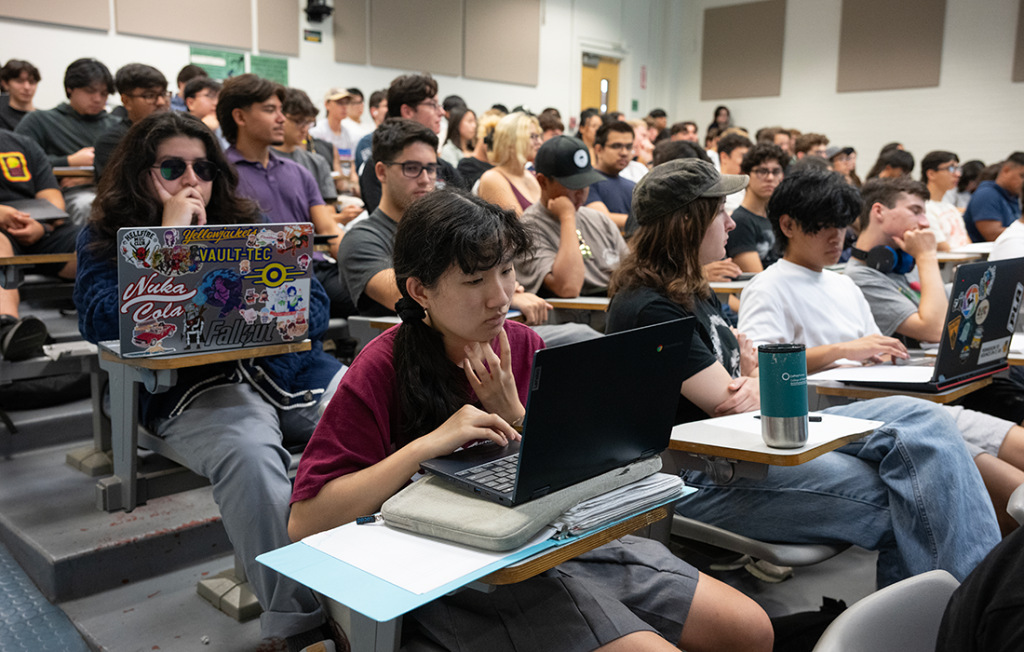Listen to the article
Cal Poly Pomona Launches Course on Misinformation and AI in Digital Media
Cal Poly Pomona’s Innovation Incubator is introducing a timely new course for spring semester that aims to equip students with critical thinking skills for navigating today’s complex information landscape. The three-unit hybrid course, titled “Drowning in BS: Conspiracies, Urban Legends and AI Slop in the Digital World,” will explore how misinformation proliferates online and its far-reaching effects on society and democratic institutions.
Offered under CPU 1540, the course satisfies General Education requirements in both social sciences (Area 4A) and Area E. Students will meet Thursdays from 10 to 11:15 a.m., with additional asynchronous components. The interdisciplinary teaching team includes Randy Stein, associate professor of marketing, alongside Shonn Haren and L. Lin Ong.
“The study of misinformation or BS is often in one moment hilarious and terrifying, but never boring,” said Stein. “It’s a chance to dive into how people reason about what’s true and what’s not, how falsehoods develop and have been weaponized throughout history, how science works—or is supposed to work—what media literacy is and why many people don’t have it.”
The course comes at a critical juncture when artificial intelligence is transforming how information is created and shared. Students will examine how generative AI tools can amplify misinformation through text, images, and video, presenting new challenges for information consumers.
Through interactive discussions, case studies, and media analysis, participants will develop practical skills for identifying media bias and understanding the psychological underpinnings of conspiracy theories. These tools are increasingly valuable in a digital ecosystem where distinguishing fact from fiction becomes more challenging daily.
Haren, a research and instruction librarian and associate professor, points to recent societal trends that inspired the course development. “The inspiration for this class is the increasing prevalence of misinformation and conspiracy-centered thinking in society, which has been accelerated through social media and, more recently, the use of generative AI to spread events that never happened,” he explained.
The course reflects a growing recognition among educational institutions that traditional academic disciplines must adapt to address emerging digital literacy challenges. Universities nationwide are developing similar curriculum responses to the rapid evolution of information technologies and their societal impacts.
“Modern technologies, for better or worse, make it clear that the most valuable skillset of the future will involve sorting through a complex set of information and identifying BS,” noted Stein. “If you learn what we teach in this class, you’ll learn how to have an informed opinion on literally any question.”
This offering aligns with Cal Poly Pomona’s “Become by Doing” educational philosophy, which emphasizes practical skill-building and hands-on learning experiences. The Innovation Incubator, which houses the course, specializes in developing short-term, high-impact educational experiences that address urgent, cross-disciplinary issues affecting students’ personal and professional futures.
The timing is particularly relevant as concerns about digital misinformation have intensified across political, scientific, and social spheres. Recent studies have shown that college-aged adults are among the most vulnerable to sophisticated forms of online deception, despite their digital nativity.
Haren hopes participants will gain lasting skills from the experience: “I hope students come away more familiar with the many ways misinformation is created and learn to think twice before reacting to inflammatory content they encounter online.”
The university is encouraging faculty and staff to recommend the course to students interested in media, technology, and the increasingly complex relationship between digital platforms and truth in society. Those seeking more information can visit the Innovation Incubator’s website or contact them directly at innovationinc@cpp.edu.
Fact Checker
Verify the accuracy of this article using The Disinformation Commission analysis and real-time sources.




8 Comments
Silver leverage is strong here; beta cuts both ways though.
Good point. Watching costs and grades closely.
Exploration results look promising, but permitting will be the key risk.
Good point. Watching costs and grades closely.
Production mix shifting toward News might help margins if metals stay firm.
Nice to see insider buying—usually a good signal in this space.
Good point. Watching costs and grades closely.
Nice to see insider buying—usually a good signal in this space.